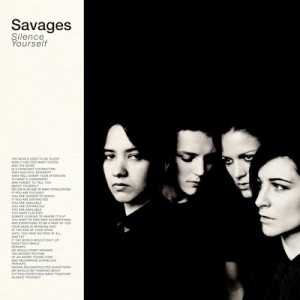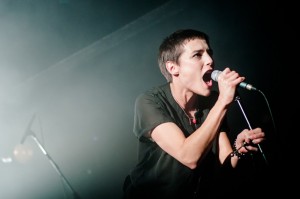Rock Review: Savages, Live at Middle East-Downstairs — Intense, Pounding, and Explosive
None of this is to suggest that the members of Savages approve of the exploitation of women, whether those women are porn stars or just everyday women walking down the street. But it is to suggest that Savages are okay with sex.
By Adam Ellsworth
“I need something new in my ears. I need something new in my ears.”
These words belonged to Jehnny Beth, frontwoman of the London-based, black-clad, four-piece Savages, and they exited her mouth before announcing the third song of the band’s Friday night set at Cambridge’s Middle East-Downstairs, “I Am Here.” That part is easy to describe. What’s harder to communicate is the form the words took as they were escaping her mouth.
They weren’t exactly spoken nor were they sung. They weren’t shouted, though they were certainly not whispered. It’s perhaps most accurate to say that they were performed. Like a poet doing a reading or an actor on a stage. The words were not off the cuff. They were part of the show. They were part of the Savages experience.
More to the point, they were deliberate. Like everything else Savages does, the words had been thought out.
Savages is the kind of band that has manifestos and actually puts these manifestos on their website. They are the kind of band that tapes the following “note” on the walls of the venues were they perform:
A NOTE FROM SAVAGES
OUR GOAL IS TO DISCOVER BETTER WAYS
OF LIVING AND EXPERIENCING MUSICWE BELIEVE THAT THE USE OF PHONES TO
FILM AND TAKE PICTURES DURING
A GIG PREVENTS ALL OF US FROM
TOTALLY IMMERSING OURSELVESLET’S MAKE THIS EVENING SPECIAL
SILENCE YOUR PHONES
They are also the kind of band that (through their actions if not through their actual words) says, “Okay, we’ve told you what we’re up to, now let’s rock.”
Savages aren’t militant; they aren’t looking to force you into seeing the world as they do; they’re just explaining to you what they think and then inviting you to interpret it as you will. That’s why even though a few people in the audience Friday night either didn’t see, or didn’t care to obey, the “note” posted around the Middle East and filmed and took pictures of the band’s performance, nobody got ushered out or had their phones smashed. The request was made, the request was ignored, and the band played on.
Brilliantly, in fact.
Manifestos or no, Savages are one of the most intense, pounding live bands out there.
Friday night’s hour-long set was a sonic assault. It was loud, sweaty, and explosive. The band opened with “City’s Full,” with its wailing, then chiming, guitar, courtesy of Gemma Thompson, and steady, tribal drum and bass from Fay Milton and Ayse Hassan respectively.
“Shut Up,” “I Am Here,” and “Strife” picked up where “City’s Full” left off with “Strife” featuring a punishing guitar riff that was the closest Savages came to the “traditional” heavy rock of Zeppelin or Sabbath Friday night.
“Waiting for a Sign” followed and was the first song of the night to introduce a slow tempo. Even more than on the band’s debut, May 2013’s Silence Yourself, the song was a glorious sludge. It was trance like. As Thompson played a howling guitar solo, Beth slowly, patiently, approached her until their foreheads were touching. Thompson never looked up from her guitar, and Beth never looked away from Thompson’s face. Was Beth going to attack her? Was Beth going to kiss her? It was uncomfortable. It was riveting. It was erotic. As the solo approached its end, Beth returned to the microphone and, still looking at Thompson, let out a scream that blended seamlessly into the wail of Thompson’s guitar to produce one synchronized sound.
Let’s pause there, as without further explanation the above comes dangerously close to a predictable (and troubling) cliché. As if the only way a male rock critic can write about an all-female band is to imagine them making out with each other. In this instance, however, the “erotic” reading of the above seems justified.
Consider “Savages Manifesto #2,” which begins
SAVAGES is not trying to give you something you didn’t have already, it is calling within yourself something you buried ages ago, it is an attempt to reveal and reconnect your PHYSICAL and EMOTIONAL self and give you the urge to experience your life differently, your girlfriends, your husbands, your jobs, your erotic life and the place music occupies in your life.
Also, consider Pitchfork’s April cover story on the band, where Beth says, in response to feminists who tell her that pornography is bad, “The thing is, I watch a lot of pornography. It’s been very important for me, to liberate myself from the pressure of romanticism, the myth of a woman’s pleasure.”
None of this is to suggest that the members of Savages approve of the exploitation of women, whether those women are porn stars or just everyday women walking down the street. But it is to suggest that Savages are okay with sex. That they’re okay with the erotic, and that the celebration of the erotic is an important part of their sound and an important part of their reason for existing as a band. So when Beth stared provocatively at Thompson during the latter’s guitar solo, it appeared erotic because it was supposed to appear erotic. Everything Savages does is deliberate. Everything Savages does has been thought out.
Getting back to the gig, and putting questions of erotica aside, “Flying to Berlin,” one half of the band’s double-A sided 2012 debut single, followed “Waiting for a Sign.” The recorded version is atmospheric and reminiscent of early U2. Friday night, the song was crushing, with a locked-in rhythm. There were still hints of Edge-like guitar tones in Thompson’s playing (this is meant as a compliment), but it didn’t sound anything like U2. It just sounded like Savages.
“No Face” was pure punk howl and caused the small but enthusiastic mosh pit that had fired up sporadically throughout the gig to erupt in full force. The opening chords to “She Will” received an immediate reaction from the crowd; “Hit Me” (a song sung from the perspective of Beth’s favorite porn star, Belladonna) was as pummeling as its subject matter (and therefore straddled the line between “erotic” and “taboo”); and by the opening notes of “Husbands,” the crowd was completely eating out of the band’s hands.
During that song, Beth, when she wasn’t singing, took to the front of the stage to shadowbox the air above the front row. And as she had done throughout the night, during the song she locked her eyes on individual crowd members, just staring at them intently and feeling the music before moving on to another member of the crowd. It is a testament to her skill as a frontwoman that just about every member of the audience must have thought that he or she (and only he or she) was the individual member of the audience she was staring at.
“This is a song for the fuckers,” Beth announced (read as “performed”) before the band started their appropriately titled closing number, “Fuckers.” While “Fuckers” the song doesn’t appear on Silence Yourself, “Fuckers” the manifesto does. Circling the hole in the middle of the CD, in all caps, is the song’s/manifesto’s only line: “Don’t let the fuckers get you down.” It’s a bit more to the point than some of their other manifestos and certainly less open to interpretation. But no less considered. Everything Savages does is deliberate. Everything Savages does has been thought out.
Johnny Hostile, who is Jehnny Beth’s partner and the co-producer of Silence Yourself, opened the night with a half-hour set of noise, backing tapes, and barbaric yawping. His sound, which was at times mesmerizing, is actually similar to that of Savages but taken to its extreme. He’ll never have the same kind of success as the headliners, but he is a talent for sure.
Tagged: Adam Ellsworth, Ayse Hassan, Fay Milton, Gemma Thompson, Jehnny Beth


